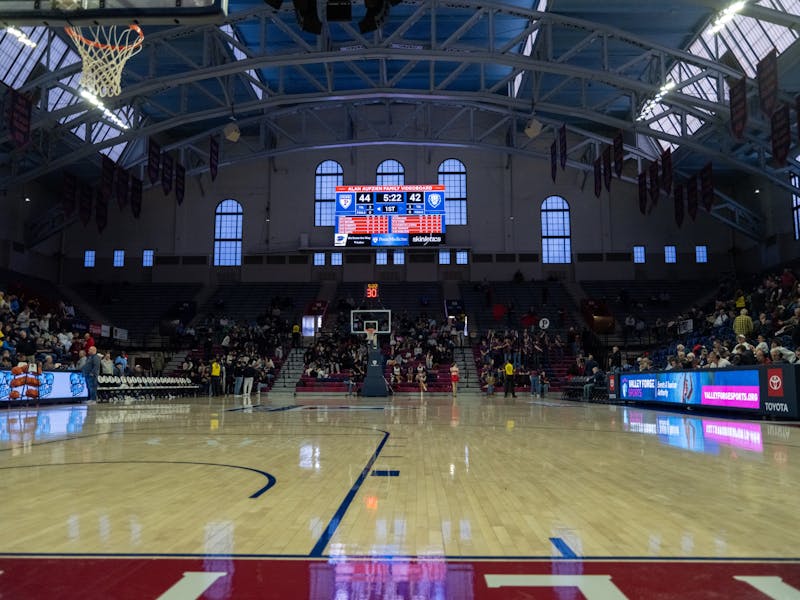
BOSTON -- Adam Keslosky kneeled on the south-side 40-yard line, his helmet on the ground, his head in his hands. The Penn senior didn't move, but it seemed like everything around him was kinetic.
Harvard players and parents and fans danced on the field, collapsing into a swarm of jubilation near the north-side 25 yard line. And above, in the just-approaching-sunset Boston sky, white-and-gray gulls flew in suddenly-large numbers.
Everything around Keslosky seemed to be kinetic, everything except his Penn teammates. Ten minutes after the game had ended, Keslosky got off his knee and looked to the right. The Quakers fullback saw his teammates walking off the field, almost in slow-motion, in disbelief.
Electric, kinetic motion was absent on the Penn side after Saturday's game, and for good reason. The Quakers lost, 28-21, and following the game, there was really nowhere for them to go, except back to Philadelphia, their 11-game win streak snapped, their Ivy title dreams dashed.
Harvard (8-0, 6-0 Ivy League), with only its second victory against the Quakers in 10 years, clinched at least a share of the Ivy League title with the win. And while Penn (7-1, 5-1) could tie the Crimson if the Quakers beat Cornell and Yale beats Harvard next Saturday, for all intents and purposes, the Crimson won the title this weekend.
What might happen next weekend would be anticlimactic, and a Penn share of the Ancient Eight crown would almost be deserving of an asterisk.
"I'm going to have a hell of a time getting the kids over this and ready for Cornell," Penn coach Al Bagnoli said.
Part of the reason for that will be the immensity and urgency of the Harvard game, as it was only the fifth time since 1910 that two Ivy unbeatens had faced each other so late in the season. And with scores of people lined up at the ticket booths before the game, the 14,818-person crowd sounding like twice as many inside, and the cool, brisk, late-autumn-in-New-England weather permeating the atmosphere, it certainly had the feel of a real football game.
"This is what we were playing for," said Penn running back Kris Ryan, who after a 138-yard rushing day on Saturday, is now just 75 yards short of the Quakers' all-time rushing record.
But the difficulty Bagnoli will face in getting his players "over this" will also be due to the way Penn lost.
The Quakers looked to be in control after they took a 14-0 lead with two big first-quarter plays -- a 37-yard pass over the middle from Gavin Hoffman to Colin Smith, complete with a dive into the end zone, and a 66-yard, one-move-and-he's gone run by Ryan.
But the Crimson came back to score 28 unanswered points. Carl Morris scored two of those four Harvard touchdowns, ending the day with nine catches for 155 yards. Harvard, which ran Josh Staph on 11 of the game's first 14 plays, also gained 145 rushing yards against the nation's stingiest rushing defense.
"We knew 14 points wouldn't win it for us," Bagnoli said.
Two key Penn turnovers ended up winning it for Harvard.
In the third, Penn receiver Rob Milanese was hit by Harvard defensive back Benny Butler on a deep pass over the middle. The ball popped out of Milanese's hands, and right into the hands of the Crimson's Willie Alford. Four plays later, Morris caught a 62-yard touchdown from Neil Rose to give Harvard a 21-14 lead.
In the fourth, the Crimson's third-string running back, Rodney Thomas, blocked a Ryan Lazzeri punt, setting up a 30-yard, Rose-to-Staph pass, making the score 28-14.
The blocked punt was the first one Penn gave up of the season-- "We picked a hell of a time to have it," Bagnoli said -- and a case of miscommunication between the line and the snapper. The Quakers made another mistake on Harvard's ensuing touchdown, when Stephen Lhotak blew his coverage and left Staph wide open in the middle of the field.
Penn gave one last, late push, as the Quakers scored on a two-play, 12-second drive with 2:12 left and followed that up by forcing a Harvard punt. But Hoffman's final Hail Mary, toward the Ivy-covered north-end-zone wall, was spiked to the ground by the Crimson's Dante Balestracci.
That sort of end was somewhat fitting, as Balestracci was the one referred to in the "Dante's Inferno" sign hanging in the south end zone, and at the game's end, everything was ablaze with energy, from the minutes-away-from-fiery sunset to the red-dominant crowd on the field.
Everything, that is, except for Keslosky and his teammates.
The Daily Pennsylvanian is an independent, student-run newspaper. Please consider making a donation to support the coverage that shapes the University. Your generosity ensures a future of strong journalism at Penn.
DonatePlease note All comments are eligible for publication in The Daily Pennsylvanian.








